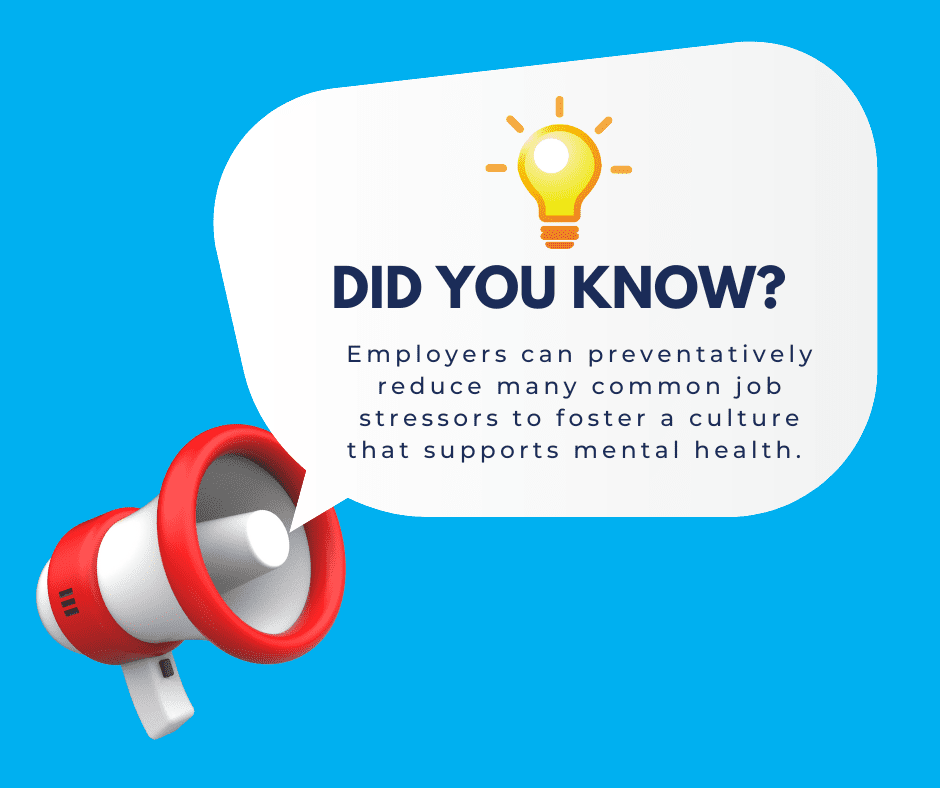Workplace Mental Health Programs
While workplace wellness programs can be associated with lowering indicators like blood pressure and cholesterol or smoking cessation, they’re far more encompassing. In addition to experiencing death or loss of livelihood, many people experienced social isolation and loneliness for the first time during the pandemic. Others navigated the exacerbation of pre-existing stress and trauma in their homes. These psychologically distressing circumstances cause absenteeism, burnout, and ultimately, productivity loss in the workplace.
This has taught us that well-being is far from purely physical health — mental health resources are vital for a healthy, productive society. Addressing medical and behavioral health cohesively could save the U.S. $37-$67 billion annually. This article discusses why mental wellness is necessary for an organization’s success and how workplace mental health programs help employees manage stressors and triggers.
How to Improve Mental Health in the Workplace
In this post:
1. Importance of Mental Health in the Workplace
b. Effects on Mental Health at Work
2. 5 Ways to Manage Mental Health in the Workplace
c. Access to Mental Health Benefits
d. Culture that Values Mental Wellness
3. The Role of Employee Wellness Programs in Mental Health Solutions
Importance of Mental Health in the Workplace
With mental and stress-related disorders escalating, organizations are acknowledging the importance of health and well-being in the corporate world. In addition to contributing to lower healthcare costs, addressing mental health strengthens employees’ resilience and ability to perform at their maximum potential.
Stressors & Triggers
Stress isn’t entirely unavoidable, but if you identify what your workforce struggles with, it can be managed and relieved. Every workplace comes with a unique set of challenges, but some common stressors are:
- Constant high-intensity atmosphere
- Lack of managerial/peer support
- Implied overtime
- Pressure to avoid PTO
- Lack of communication (uncertainty)
- Job insecurity
- Lack of staffing support
- Poor financial management
Effects on Mental Health at Work
Unchecked mental health and workplace stressors are detrimental to an organization. Employees may exhibit irritability and a low tolerance for their peers, negatively impacting team morale. They may also experience a range of turbulent emotions such as feeling withdrawn, discouraged, or angry, impacting their ability to form positive connections with colleagues.
Emotional turmoil eventually manifests in the physical body. This behavior is often an indicator of employees experiencing chronic stress, which puts them at risk for depression, obesity, diabetes, mood disorders, arthritis, or poor cardiovascular health. Organizations that neglect the mental health of their workforce have higher turnover and unemployment rates because employees can’t cope with the constant pressure, overwhelming feelings, or resulting physical ailments.

Management Support
Management plays a transformative role in workplace mental health. It’s critical leaders are trained to recognize signs of emotional distress and substance abuse, and how to approach struggling employees with empathy and understanding. Employees should feel safe expressing mental health concerns and confident that they’ll be met with a lack of judgment and helpful resources and support.
One-on-one sessions between managers and employees provide a private space for transparent conversations and an open dialogue that builds trust and empowers employees to seek the help they need to perform the way they want to. Management support can also include promoting mental health resources or programming, offering flexibility, and demonstrating a commitment to their own well-being. Managers that embrace their role in workplace mental health programs become a driving force in creating an environment that nurtures employee well-being and organizational success.
Education
Strengthen your workplace efforts on mental health by extending education beyond leadership teams. Easily accessible seminars/webinars, workshops, or educational resources help employees understand what mental health is and how to recognize turbulence in themselves or colleagues.
Mental health education equips employees with the knowledge and tools they need to support one another and feel empowered to access the assistance they may need. The awareness of mental health challenges in the workplace is foundational in promoting a culture of understanding and empathy.
Access to Mental Health Benefits
Employers can demonstrate a commitment to supporting their population’s mental well-being by providing comprehensive mental health benefits. This encompasses a range of services including low out-of-pocket costs for counseling, therapy, medication coverage, or subsidized clinical screenings. Providing access to mental health benefits reduces the financial burden associated with seeking treatment, enabling employees to prioritize their mental health.
Culture that Values Mental Wellness
For employees to feel supported and empowered to prioritize their mental well-being, organizations must create space for open, collaborative discussions that have historically been taboo in the workplace. Providing self-assessment tools and orchestrating voluntary small group sessions are great outlets for employees to explore the roots of their mental challenges.
Collaborative discussion eliminates shame associated with mental illness as peers work through pain together rather than in silence. Workshops can also focus on problem-solving strategies to help employees navigate potential stressors.
A workplace culture that values mental wellness encourages employees to share success stories about how they’ve overcome adversity to achieve well-being, and how they apply that success to their work environment. This peer-to-peer support eliminates the stigma surrounding mental illness and prevents employees from being physically close, but emotionally distant and isolated.
Learn more about promoting health in the workplace.
The Role of Employee Wellness Programs in Mental Health Solutions
Creating wellness opportunities is a resourceful and effective way to help employees be mindful of the state of their mental health. Organizations can survey their population and design employee wellness programs that combat the specific stressors inherent in their workforce. Between interactive education, practical tools, and physical activities or classes, workplace wellness programs help employees identify what they or others are at risk for and connect them with treatments and resources.
For example, a program consists of a health talk that covers common types of mental health issues in the workplace or how to cope with anxiety, a weekly mindfulness/meditation class, a weekly mat pilates class, and a healthy cooking demo every other month. This design educates employees about mental health, provides outlets to relieve and manage stress individually and as a group, and acknowledges that true well-being must be addressed comprehensively with an overall healthy lifestyle.
The more access employees have to wellness opportunities, the stronger they become at managing and withstanding stressors and triggers in their lives.
Strive Workplace Mental Health Programs
Mental health plays a vital role in overall well-being. Strive offers stress management and mindfulness programs that can be seamlessly integrated into existing programs, as well as all-encompassing wellness program offerings with turnkey administration (ideal for organizations wishing to avoid multiple vendors). Designing a wellness program with a strong emphasis on workplace mental health with Strive includes offerings like:
- Mindfulness-based stress reduction (MBSR)
- Meditation
- Yoga classes
- Classes, workshops, coaching, & webinars on mental health education
- Dance therapy
- Art therapy
- Onsite chair massage
Book a discovery call below to speak with a wellness expert about customizing a workplace mental health program for your organization.



